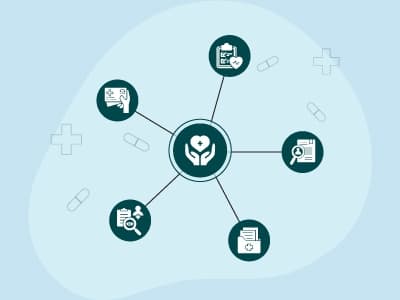
In healthcare, compliance isn’t optional but a necessity.
Despite the healthcare industry being highly regulated, one can easily land into legal trouble, penalties, and consequences that may affect patients' safety. However, healthcare compliance programs keep the trouble away.
So, what is a compliance program in healthcare? A compliance program helps reduce compliance violations while improving the overall image of healthcare organizations by establishing ethical standards and ensuring adherence to relevant laws and regulations.
This blog will guide you through the fundamental principles of creating an effective healthcare compliance program so that your organization runs efficiently.
A healthcare compliance program includes several components essential in ensuring an organization complies with the set laws. It serves as a guide to healthcare compliance framework that reduces risks, such as legal penalties and data breaches, while enhancing patient safety and promoting integrity.
Written Policies And Procedures

Policies and procedures are the foundation of any compliance program and should be articulated clearly. Examples of such policies may include HIPAA compliance programs. Whether it pertains to patient data privacy or billing, written policies add structure and ensure that staff knows how to handle the compliance process effectively.
Cleveland Clinic’s recent patient data breach is a perfect example of how written healthcare compliance policies and procedures can overcome these challenges. Earlier, the clinic had reported several data breaches, such as cases where clients’ data were accidentally shared with third parties. Subsequently, the clinic revised existing policies and procedures on patient data privacy to enhance administrative and technical controls, which helped it enhance protection and compliance.
Compliance Leadership And Oversight
It is important to have strong leadership to support the implementation and sustainability of compliance programs. Having a compliance officer or committee in place means that there is always someone responsible for monitoring and overseeing the company’s day-to-day activities, as well as handling new and emerging risks and promoting accountability.
Training And Education

Compliance training ensures that all organizational staff, from seniors to entry-level employees, are aware of their compliance obligations. Continuing education ensures that healthcare workers are always informed of any updates in regulations and practices, making it part of their daily work routine.
According to the 2024 Healthcare Compliance Benchmark Report, OIG requires regular and effective training programs. The survey reveals that 61% of the respondents implemented this best practice.
Effective Communication Channels

It is crucial for employees to share their concerns or questions freely regarding compliance issues without the risk of retribution. It may involve providing an anonymous free hotline or a direct line to the compliance officer, creating a culture of openness.
Internal Monitoring And Auditing

Monitoring and auditing determine the effectiveness of a compliance program. This way, medical organizations can detect problems at an early stage and address them before they worsen.
Internal audits also allow healthcare professionals to determine if policies are being implemented or if any changes are required.
Enforcement Of Standards

Every compliance program should have a way of implementing its standards. This involves implementing measures for individuals who do not comply with the established rules and ensuring that penalties are issued promptly. Putting such standards into effect reduces the likelihood of non-compliance and reasserts the organization’s commitment to ethical practices.
Failure to ensure the implementation of compliance may lead to serious consequences. Recently, a lawsuit has been filed against Rite.Aid because of a breach of personal information of 2.2 million customers.
Responding To Offenses And Corrective Actions

Healthcare organizations must act appropriately in case of a data breach. They must conduct thorough investigations and take corrective actions and follow-ups to ensure that such cases do not happen in the future.
A structured response plan is important to preserve the confidence of the public, solving problems in a way that complies with the law and ethics.
It is important to evaluate the healthcare compliance program to check its effectiveness. The following are some of the key areas to focus on:
All these measures assist healthcare organizations to operate at the highest levels of compliance.
There are numerous benefits of a compliance program in healthcare organizations. The following are some of them:
It is important to regularly update the healthcare compliance programs. The following measures can be taken to stay in compliance with the existing regulations:
Organizations must focus on these elements to ensure that their compliance programs are updated and effective.

Healthcare compliance is a critical factor for the protection of patients’ information, reducing lawsuits, and improving organizational reputation. It demands perseverance to respond to new requirements and new problems that may arise.
One of the most common yet important examples of healthcare compliance programs is HIPAA compliance. This way, healthcare organizations can ensure they have a high level of compliance while keeping their reputation intact.
